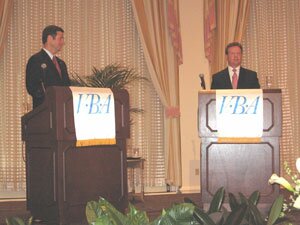NEWS- Boot-ville: Footwear defines Senate campaign
It's been 18 years since Spike Lee appeared in a Nike television spot and said the words, but if the July 22 debate between U.S. Senator George Allen and his Democratic challenger, Jim Webb, is any indication, the words are just as true as ever. If there's one thing that characterizes each candidate, "It's got to be the shoes."
Webb strode into the grand ballroom of The Homestead in Hot Springs wearing his Marine combat boots– a reminder of his service in Vietnam. Moments later, Allen walked the same aisle wearing the cowboy boots that have become his trademark. For the next 105 minutes, it seemed the shoes fit. In their first face-to-face meeting as opponents, Webb– the stoic, rigid military man– squared off against Allen, the folksy, politically able everyman.
If this election is to become a nasty, mudslinging affair, one wouldn't have known it from sitting in the room at the Virginia Bar Association-sponsored event. In fact, at times the two sounded like old friends, calling each other by their first names, swapping stories about working for Ronald Reagan (Allen as chairman of Young Virginians for Reagan in 1976 and Webb as Reagan's Secretary of the Navy), and even making plans to meet again in a less formal setting.
"I like George Allen," said Webb. "He's someone I wouldn't mind going out and having a beer with."
"I wish Jim were still endorsing me, I'd buy him a beer," Allen replied, alluding to Webb's public support for Allen in the 2000 race.
But not all the sparring was so chummy. Allen suggested that because Webb switched from the Democratic Party to the GOP and back again, "Someday we're going to be using the acronym R2-D2."
Webb countered that Allen had agreed with President Bush 97 percent of the time and said, "When two people agree 97 percent of the time, one of them doesn't need a job."
But it was Allen who scored the most visible blow. In the segment where the candidates put questions to one another, Allen caught Webb unprepared when he asked "What's your position on the proper use of Craney Island?"
"I'm not sure where Craney Island is," replied Webb. "Why don't you tell me?"
Allen proceeded to inform Webb, and the rest of the room, that Craney Island is a man-made peninsula off the coast of Portsmouth under the control of the U.S. Army Corps of Engineers for which the Senate had appropriated $671.3 million for expansion and construction of a fourth port three days earlier.
After the debate, Webb blasted Allen's question as "gotcha politics" adding, "Anybody can have an esoteric issue put in front of them. He clearly didn't know the Montgomery GI Bill was a peacetime bill." Webb was referring to his own question about a proposal to fund today's veterans' education the way it had been funded for the veterans of World War II.
"It's a big, big deal. We just acted on Craney Island," Allen told reporters afterward. "This fourth port will mean thousands of jobs. It's not as if I asked him about someplace where nobody lives."
The pop quiz was the one unscripted moment in a debate for which both candidates had carefully planned their remarks. On the issue of Iraq, Allen reiterated his claim that "We can't tuck tail and run," while Webb reminded the audience that he had opposed invading Iraq in 1991 and in 2002, warning, "There will not be stability in the region until we leave."
Speaking with reporters, both expressed hope that American troops can be brought home soon, but differed on the method of expediting their return. "We can be out of Iraq in two years if we put the right diplomatic forces in play," Webb said. "Nobody can sit out."
"As soon as the Iraqis stand up, we will stand down," Allen retorted. Asked how to define that moment, Allen spoke of a recent meeting with Gen. George Casey, leader of U.S. military operations in Iraq. "He says right now one-fourth of the military operations in Iraq are led by Iraqis, and he thinks it can be three-fourths by the end of the year."
Among the other topics covered were embryonic stem cell research (Webb is for federal funding of it, Allen opposes it), affirmative action (Webb says it should apply only to African-Americans as compensation for slavery, saying, "I will fight for the rest of my life" to limit it as such; Allen emphasized the need to fully fund Virginia's historically black colleges), and the proposed Virginia constitutional amendment banning gay marriage (Webb opposes the amendment because of "how it could affect heterosexual and homosexual relationships"; Allen says he backs the amendment so that marriage in Virginia will be clearly defined "when Bob and Bill move from another state, like Massachusetts.")
Campaign managers are negotiating details of future debates, but currently the only firm date is September 18 at the Fairfax County Chamber of Commerce. The election for the six-year job takes place November 7.

In their first meeting as opponents, Sen. George Allen and Jim Webb debate Iraq, affirmative action, and gay marriage.
PHOTO BY LINDSAY BARNES